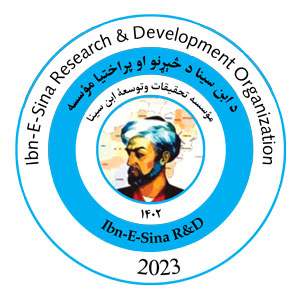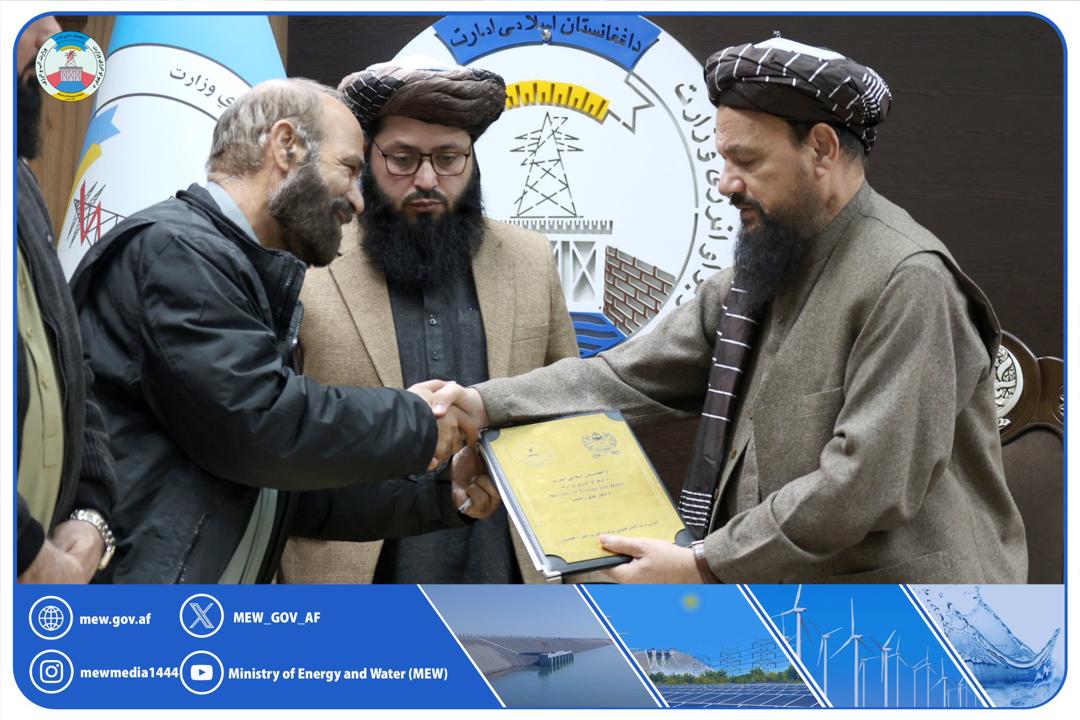Ibn-E-Sina Research & Development Organization (ISRDO) signs a cooperation agreement with Ministry of Water & Energy of IEA
On 12 Jumada al-Thani 1446 AH (December 14, 2023), Ibn-E-Sina Research & Development Organization (ISRDO) and the Ministry of Water and Energy of the Islamic Emirate of Afghanistan formalized a transformative partnership through the signing of a cooperation agreement. This agreement marks a significant step toward revitalizing Afghanistan’s water and energy sectors, focusing on sustainability, innovation, and self-reliance.
A Historic Collaboration
The agreement was signed during an official ceremony held at the Ministry’s headquarters. It brought together senior leaders from both sides, signaling their shared commitment to addressing Afghanistan’s infrastructure and energy challenges.
Key Attendees:
From the Ministry of Water and Energy:
•Mullah Abdul Latif Mansoor, Honorable Minister of Water and Energy.
•Qari Abdul Aziz Aziz, General Director of the Minister’s Office.
•Maulvi Abdul Rahman Rahmani, General Director of Sustainable Energy.
•Other senior officials, including engineers, spokespersons, and investment directors.
From ISRDO:
•Dr. Mohammad Akram Azimi, Chief Representative.
•Engineer Ghulam Sakhi Hassan Zada, and several other senior members of the organization.
Ceremony Highlights
The event began with a recitation from the Holy Quran, symbolizing the profound importance of this collaboration in rebuilding the nation.
Shared Vision for Development
Engineer Mohammad Dawood Azimi, representing ISRDO, provided an overview of the organization’s mission and its alignment with Afghanistan’s development needs. He expressed gratitude to the Ministry for their proactive approach in facilitating the agreement.
Engineer Ghulam Sakhi Hassan Zada emphasized that this agreement is more than a document—it is a roadmap for transformation. He highlighted that decades of conflict, foreign intervention, and reliance on imports had stalled progress in Afghanistan’s water and energy sectors. This partnership aims to reverse those setbacks by utilizing local resources and expertise to achieve energy independence and economic self-sufficiency.
Innovative Solutions: Introducing CONTRA Software
One of the event’s highlights was the introduction of CONTRA, a cutting-edge software designed by Dr. Mohammad Farhad Zazai. This tool streamlines infrastructure development by identifying efficient and cost-effective routes for roads, power lines, fiber-optic networks, and water canals. Its application promises to significantly enhance planning and reduce project costs, making it a vital asset for Afghanistan’s infrastructure projects.
Signing of the Agreement
The agreement was signed by:
•Mullah Abdul Latif Mansoor, on behalf of the Ministry of Water and Energy of IEA.
•Dr. Mohammad Akram Azimi, representing ISRDO.
This formalization underscores the mutual trust and shared responsibility to drive meaningful change in Afghanistan’s energy and water sectors.
A Call to Action for Progress
In his address, Mullah Abdul Latif Mansoor highlighted the critical need to harness Afghanistan’s internal resources to address the nation’s energy needs. He stressed that energy is the foundation of national progress and called on Afghan professionals and youth to leverage their skills and education to rebuild the country.
He acknowledged the challenges inherited from decades of turmoil but emphasized that with peace now restored, the time for rebuilding is at hand. This agreement represents a beacon of hope for overcoming those challenges through collaborative efforts and a focus on innovation.
Key Goals of the Agreement
1.Conducting groundbreaking research on water and energy issues.
2.Training Afghan professionals to elevate local expertise.
3.Establishing and equipping modern research and training centers.
4.Hosting specialized workshops and training programs to enhance sectoral skills.
5.Introducing and implementing advanced technologies to optimize resources.
Conclusion
The ceremony concluded with prayers led by the Honorable Minister, invoking blessings for the success of this partnership. The agreement reflects a shared vision for a self-reliant, sustainable, and prosperous Afghanistan, underpinned by innovation and collaboration.
Ibn-E-Sina Research & Development Organization
Author

